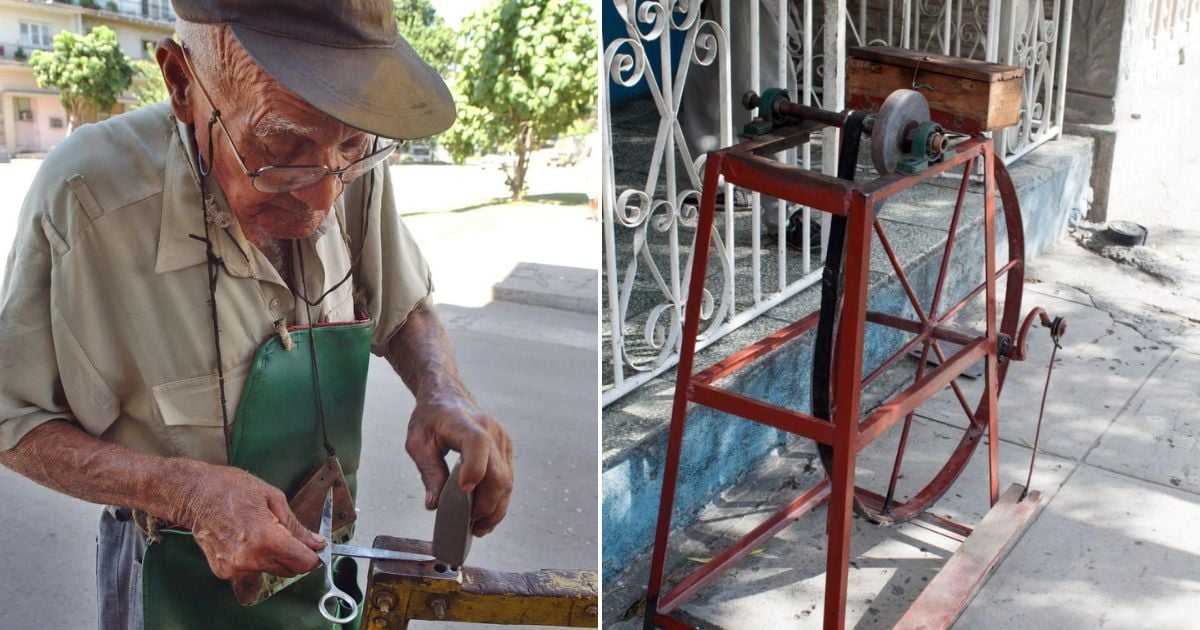
A young Cuban living in Miami, United States, reminisced fondly about the profession of the knife and scissors sharpener, a craft that would echo through the streets of his hometown Cárdenas, Matanzas, with its distinctive whistle, marking the daily routines of many households. Although this practice has vanished today, it remains alive in the memories of those who experienced it.
Christian Arbolaez, the author of this moving account, shared a chronicle on his Facebook profile that reflects the importance and significance of this work in the daily lives of Cuban families.
In her post, she describes how her grandmother patiently and eagerly awaited that unmistakable sound that filled the streets: the whistle of the sharpener, as it was for her an almost ceremonial ritual that brought the whole household to life.
“If you hear him, let me know quickly,” her grandmother said as she got ready to intercept the sharpener with the scissors and knives that needed to regain their edge.
Arbolaez's description transports the reader to those Saturday mornings when the sun gilded the sidewalks of Cárdenas and the day was just beginning.
In his account, he describes how the knife grinder, with his bicycle or work apparatus, provided a unique spectacle: spinning the wheel, creating sparks, and bringing life back to household tools.
The young man also reflects on the family legacy that accompanied this craft: "That whistle is the same as always," his grandmother used to say, suggesting that the sharpener had inherited both his skill and his tool from previous generations.
However, as Arbolaez notes, that tradition seems to have faded in today's Cuba: "There is no longer anyone who walks the streets sharpening knives or repairing scissors, and tools, like memories, wear out irreparably."
Although she now lives far away, she confesses that every time she thinks of those Saturdays with her grandmother, she feels that, at least in her memory, that whistle continues to echo.
Christian Arbolaez's chronicle not only evokes nostalgia for a lost trade but also invites reflection on the small traditions that once gave meaning to daily life and that are now fading into oblivion.
Frequently Asked Questions about the Tradition of the Sharpeners in Matanzas and Cuban Nostalgia
What did the profession of the sharpener represent in Matanzas?
The trade of the sharpener was a fundamental part of daily life in Matanzas. The sound of the sharpener's whistle signaled his arrival, prompting families to eagerly await the sharpening of their knives and scissors. It was a ritual that fostered a sense of community and family connection.
Why has this tradition disappeared in Cuba?
Christian Arbolaez's chronicle indicates that the tradition of the sharpener has faded in today's Cuba due to social and economic changes. Sharpening tools have become less common, and the new generations no longer rely on this trade in their daily lives.
How is the nostalgia for Cuban traditions kept alive abroad?
Many Cubans abroad, like Christian Arbolaez, keep the nostalgia for their traditions alive through shared memories on social media. Activities such as flying kites in Miami or cooking traditional dishes help recreate a sense of belonging and connection to their roots.
What impact does emigration have on the preservation of Cuban traditions?
Emigration can be a challenge for the preservation of traditions, but it can also be a way to keep them alive in exile. Cuban emigrants often adapt to new cultures while striving to preserve and share their customs, such as cooking traditional dishes or celebrating island-specific holidays.
How is nostalgia reflected in the Cuban community abroad?
Nostalgia is a common feeling among Cubans living abroad, who often fondly remember their experiences on the island. Moments like cooking a pumpkin or recalling iconic places such as the Mirador de Bacunayagua evoke an emotional connection to their homeland, despite the distance.
Filed under: